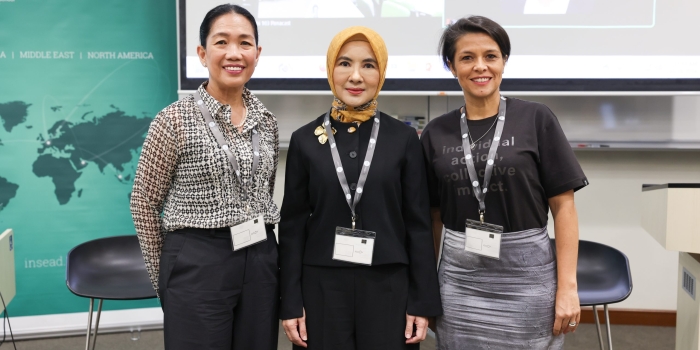Record numbers attend annual Tanoto Scholars Gathering
#TSG15 - Tanoto Scholars Gathering 2015A record 266 Tanoto scholars attended the Tanoto Scholars Gathering from 12 to 15 August...

Latest updates on what's happening in RGE Group

As the world faces the urgent need to decarbonise and mitigate climate change, the spotlight has turned to biofuels as a promising solution. At the Southeast Asia – Latin American Dialogues (SALA Dialogues) 2024 organised by the Latin American Chamber of Commerce, Singapore (LatAmCham) in collaboration with the INSEAD Hoffmann Institute, Lucita Jasmin, Group Sustainability Director at RGE, Nicke Widyawati, President Director and CEO of Pertamina and Fernando Verzoni, Partner at Veirano Advogados, discussed the evolution and future of biofuels. The panel was moderated by Angela Torres-Andresen, Founder & Director at LatAmCham.
Brazil has emerged as a global leader in biofuels, second only to the United States, largely due to its long-standing ethanol programme. The country’s ethanol production, which began in the 1970s, primarily uses sugarcane, an abundant and highly efficient feedstock in Brazil’s tropical climate. Sugarcane-based ethanol boasts a high energy yield and a significantly lower carbon footprint compared to corn-based ethanol produced in the U.S., making it a compelling choice for reducing greenhouse gas emissions.
Brazil mandates a 27% ethanol blend in gasoline across all fuel stations and supports flex-fuel vehicles that run on either ethanol or gasoline, providing flexibility and contributing to energy diversification. However, traditional ethanol production raises concerns around land use and potential competition with food production. To address this, Brazil is increasingly adopting second generation (2G) ethanol technology.
Unlike first-generation ethanol, which is derived from sugarcane, 2G ethanol uses residual biomass, such as sugarcane bagasse and straw, enabling higher ethanol output from the same land area. Though more capital-intensive, this advancement allows Brazil to increase biofuel production without expanding cropland, reducing environmental pressures.
Indonesia, on the other hand, currently relies on imported fuel, which heightens the urgency to find locally-sourced alternatives. This dependency, coupled with Indonesia’s commitment to achieving net zero emissions by 2060, underscores the critical need for energy transition, particularly toward biofuels.
Since 2018, the country has expanded its biodiesel blending requirements, reaching B35 (35% biodiesel mix) in recent years. This shift has not only cut down Indonesia’s gas oil imports, boosting self-sufficiency, but has also curbed emissions by over 32 million tons annually. By leveraging its natural resources, Indonesia is setting an example for energy transitions in developing economies worldwide.
Both Brazil and Indonesia are making significant strides in biofuels production, addressing the dual challenges of greenhouse gas emissions and food security. Brazil’s leadership in ethanol production, particularly through sugarcane and biomass waste, showcases how yields can be enhanced without compromising on agricultural land. Meanwhile, Indonesia’s biofuel initiatives and implementation of bio-diesel mandates demonstrate a proactive approach to achieving energy independence while reducing reliance on fossil fuels.
For RGE, biofuels are not merely a regulatory obligation but an integral part of its long-term decarbonisation strategy. In 2015, the company adopted a robust ESG framework that laid the foundation for its ambitious sustainability targets, including reducing emissions intensity by up to 50% and achieving net zero by 2050. The framework also provides an overarching guidance for RGE’s business groups, which have adopted a 2030 sustainability agenda with commitments across climate, nature, people and inclusive growth.
“A key pillar of our sustainability commitment has to do with our decarbonisation,” Lucita said. As a cornerstone of RGE’s decarbonisation strategy, RGE sources biofuels from renewable biomass and byproducts within its production processes, significantly reducing reliance on fossil fuels. For instance, RGE’s pulp mills in Indonesia are 88% powered by biomass from renewable sources. Additionally, RGE’s agribusiness, Asian Agri, sources 96% of its energy from biomass by capturing methane from production waste, thereby reducing emissions while powering its mills.
RGE’s biofuels strategy has paved the way for the group’s expansion into new sectors, such as aviation. Through a joint venture with Cepsa, RGE is establishing a state-of-the-art facility in Spain that is capable of producing 500,000 tonnes of sustainable aviation fuel (SAF) annually. The facility will utilise agricultural waste and residue and used cooking oil, converting them into 2G feedstock for SAF.
The projected global demand for SAF is expected to reach 5 billion litres by 2050, while current production stands at a mere 600 million litres. RGE’s €1 billion investment in this facility is a landmark move, and underscores the company’s commitment to driving sustainable solutions in high-demand industries while reducing reliance on fossil fuels in aviation.
“There’s a significant growth opportunity for SAF globally,” Lucita noted. “Sustainable aviation fuel, compared to fossil fuel, is supposedly going to reduce emissions by up to 80%, but the current use of SAF is only at 0.1%. Now, we are able to produce SAF using the effluent or the agri waste from oil palm manufacturing.”
Southeast Asia alone produces about 16 million tonnes of agricultural waste annually, presenting a substantial opportunity for RGE to contribute to the decarbonisation of aviation while creating new revenue streams.
Brazil and Indonesia’s efforts to scale biofuel production reflect the power of strategic public-private collaborations in addressing global energy and environmental challenges, and highlight how government policy can complement private sector innovation to accelerate the transition to cleaner energy.
RGE’s own commitment to sustainability is testament to the importance of such collaborations, and exemplifies how the private sector can leverage government policies to help drive meaningful change across high-demand industries like aviation.
As biofuel production and clean energy solutions continue to evolve, these partnerships will play a critical role in shaping a sustainable, low-carbon future for the world.